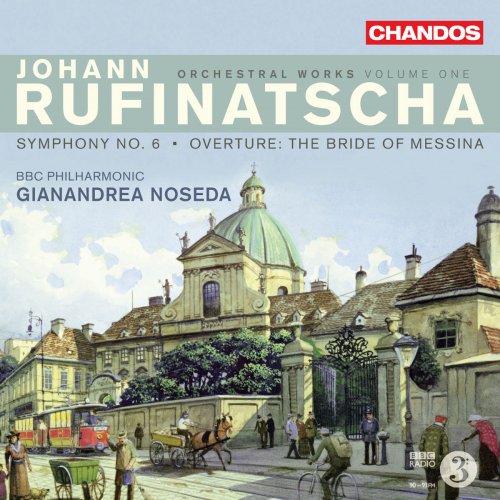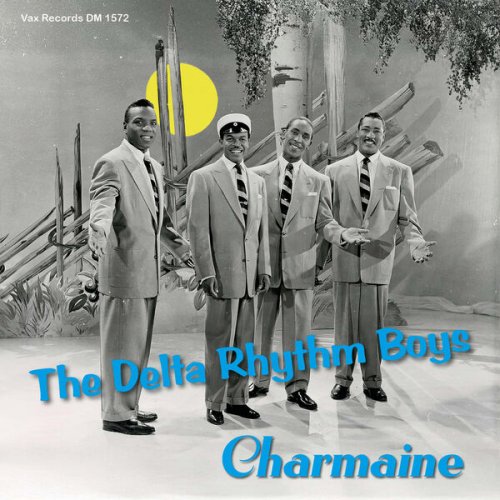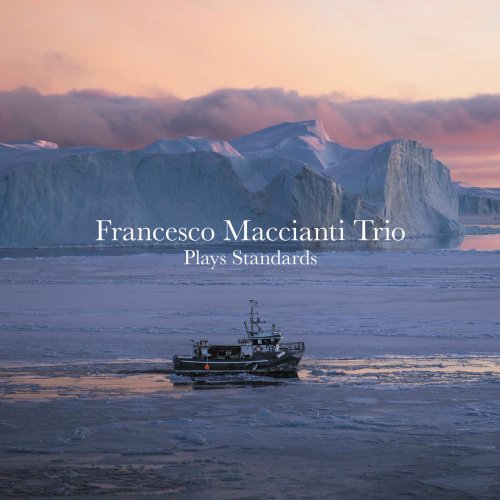BBC Philharmonic, Gianandrea Noseda - Rufinatscha: Symphony No. 6 & The Bride of Messina Overture (2011) [Hi-Res]

Artist: BBC Philharmonic, Gianandrea Noseda
Title: Rufinatscha: Symphony No. 6 & The Bride of Messina Overture
Year Of Release: 2011
Label: Chandos
Genre: Classical
Quality: flac lossless / flac 24bits - 96.0kHz +Booklet
Total Time: 01:11:02
Total Size: 303 mb / 1.19 gb
WebSite: Album Preview
TracklistTitle: Rufinatscha: Symphony No. 6 & The Bride of Messina Overture
Year Of Release: 2011
Label: Chandos
Genre: Classical
Quality: flac lossless / flac 24bits - 96.0kHz +Booklet
Total Time: 01:11:02
Total Size: 303 mb / 1.19 gb
WebSite: Album Preview
01. Die Braut von Messina Overture
02. Symphony No. 6 in D major: I. Largo - Allegro con fuco
03. Symphony No. 6 in D major: II. Scherzo. Allegro ma non troppo
04. Symphony No. 6 in D major: III. Largo
05. Symphony No. 6 in D major: IV. Allegro moderato
![BBC Philharmonic, Gianandrea Noseda - Rufinatscha: Symphony No. 6 & The Bride of Messina Overture (2011) [Hi-Res]](https://www.dibpic.com/uploads/posts/2020-10/1603886260_bbc-philharmonic-gianandrea-noseda-johann-rufinatscha-orchestral-works-volume-1-2011-back.jpg)
This is Volume 1 of a planned series of three, bringing to life the rarely heard but colourful music of the Austrian composer Johann Rufinatscha. The works presented here have never been recorded before, and are performed by the BBC Philharmonic Orchestra under Gianandrea Noseda, an exclusive Chandos artist – a partnership of long standing, noted for the precision and fullness of their sound as well as for the strength of their musical interpretations.
Although very little is known of Johann Rufinatscha today, in his time he held an established place in Vienna’s highest musical circles and enjoyed considerable acclaim for his orchestral, chamber, and piano works, some even predicted for him a stellar future. He was a respected teacher and a great friend of Brahms who was not a man to suffer musical fools gladly. The music of Rufinatscha, represented here by two later works, is rich and dramatic, with expressively charged melodies running throughout. His orchestral works are ambitious in scale, strong in content, and suggest a confident, refreshingly unfettered musical mind. Still, his output tailed off strikingly after he completed his Sixth Symphony (recorded here), and he increasingly devoted his energies to teaching, especially piano and harmony, in which he exerted a significant influence – pupils included the pianist Julius Epstein and the pianist-composer Ignaz Brüll.
We do not know what prompted Rufinatscha to write his Overture The Bride of Messina, but at fourteen minutes it would not have been the prospect of a theatrical performance. The overture is far too large – in more senses than one – to function successfully as a curtain raiser. It’s a substantial and very powerful piece that sums up the storyline of Friedrich Schiller’s play Die Braut von Messina perfectly. The richly contrasted opening sets the overall tragic mood of the opera, while the tellingly tender lyrical theme, set on violas and cellos, that follows is symbolic of Schiller’s character Beatrice who is loved by two brothers, neither of whom is aware that she is in fact their sister. The conflict that builds between the brothers throughout is portrayed through characteristically fine trumpet writing.
Symphony No. 6 is an accomplished and richly contrasted work that bears no sign of a composer in decline or about to face it. Nonetheless, it is one of the very last works that Rufinatscha composed before dedicating his time solely to teaching. Following an imposing, Schubert-inspired opening tutti, a bracing Allegro con fuoco takes centre stage. Then follows a melodic and infectious Scherzo, and a sombre Largo coloured by clarinets, bassoons, violas, and cellos, before the finale builds to a resolute and rousing conclusion that only leaves us wondering: What happened to Johann Rufinatscha?
![Yasuhiro Usui, Ryoko Ono and Taro Tatsumaki - The House Concert Live Collection, Vol. 55: Yasuhiro Usui (Live at 3rd Floor, Artist House, Daehak-ro, Seoul, 7/12/2015) (2025) [Hi-Res] Yasuhiro Usui, Ryoko Ono and Taro Tatsumaki - The House Concert Live Collection, Vol. 55: Yasuhiro Usui (Live at 3rd Floor, Artist House, Daehak-ro, Seoul, 7/12/2015) (2025) [Hi-Res]](https://www.dibpic.com/uploads/posts/2025-12/1765791289_rchn1y2nh7yfb_600.jpg)


![Marju Kuut - Marju Kuut: Üksi, kuid vabana (2025) [Hi-Res] Marju Kuut - Marju Kuut: Üksi, kuid vabana (2025) [Hi-Res]](https://www.dibpic.com/uploads/posts/2025-12/1765641100_cover.jpg)
![Don Cherry, Nana Vasconcelos & Collin Walcott - Codona (1979/2025) [Hi-Res] Don Cherry, Nana Vasconcelos & Collin Walcott - Codona (1979/2025) [Hi-Res]](https://www.dibpic.com/uploads/posts/2025-12/1765970766_cover.jpg)

![Koldo Munné & 1520's Ensemble - Live at Jamboree Live Music (2025) [Hi-Res] Koldo Munné & 1520's Ensemble - Live at Jamboree Live Music (2025) [Hi-Res]](https://www.dibpic.com/uploads/posts/2025-12/1765846749_ck2b0xbsb8jna_600.jpg)

